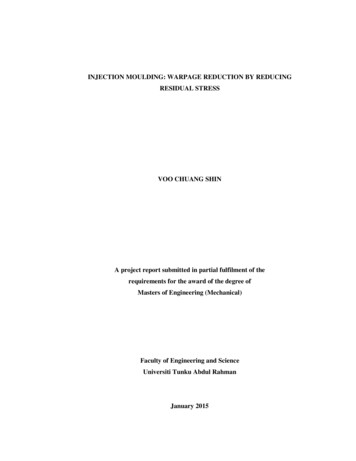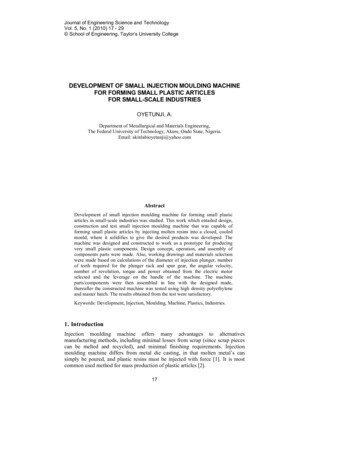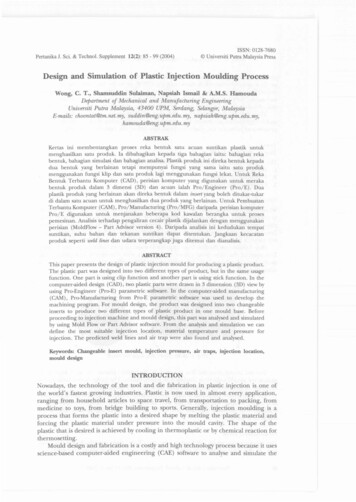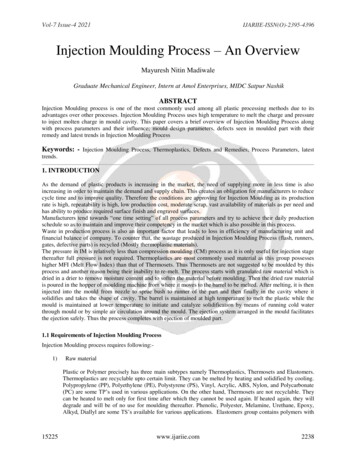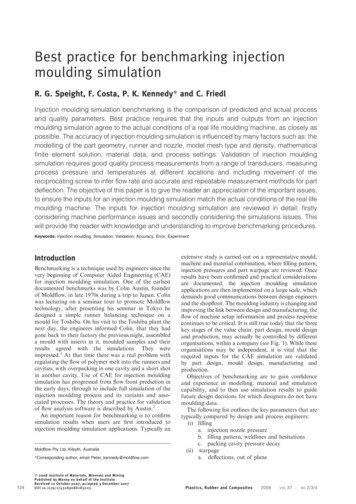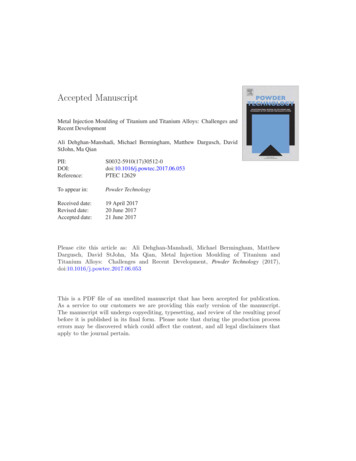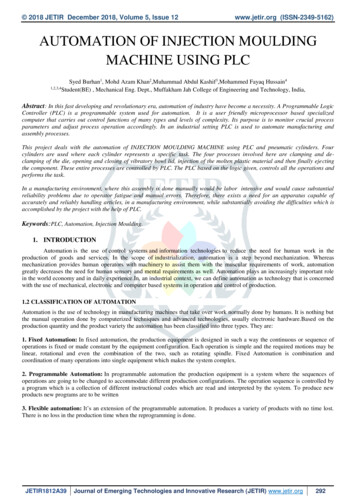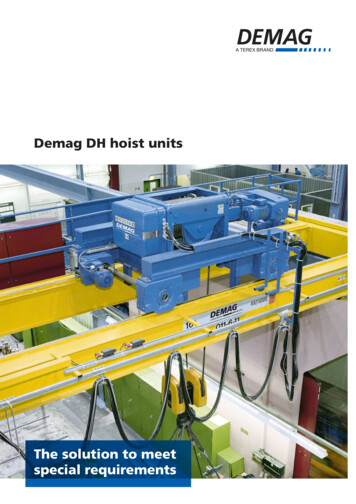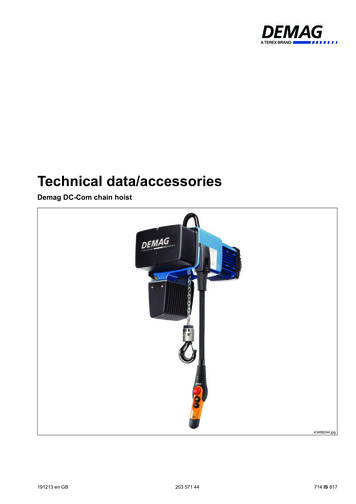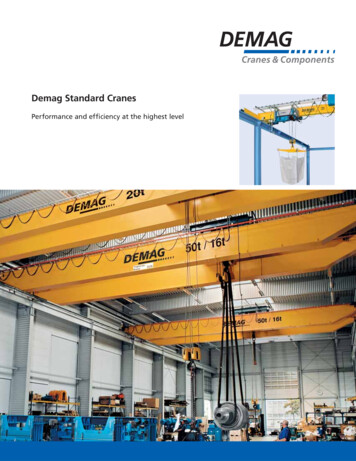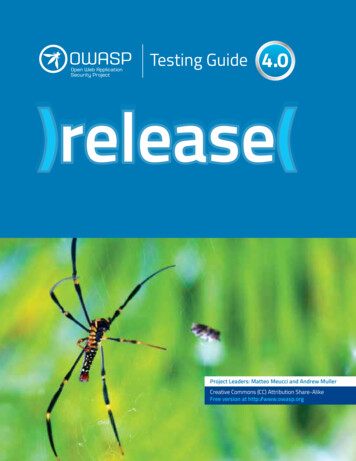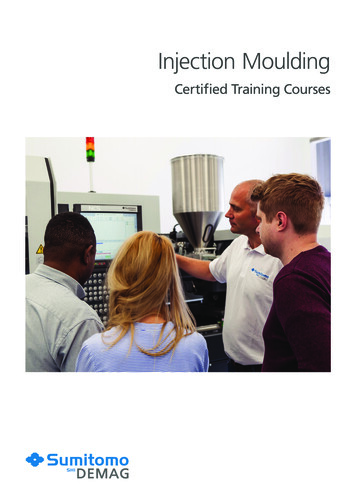
Transcription
Injection MouldingCertified Training Courses
Progressive, structured and relevant training coursesIntroductionBenefits For Your CompanySumitomo (SHI) Demag UK (SDUK) has developed arange of injection moulding courses to address the skillsshortage seen within the plastics industry. We trainnot only our customers, but also anyone who wishesto further enhance their knowledge of the injectionmoulding process to make financial gains. Increased productivityThe SDUK core training programme delivers highquality process training. The courses are designed tobe modular and offer a logical progression from basicsetting to advance process engineering. Improved qualityFor anyone with existing injection moulding experiencewho may wish to join the programme at a later stage,please speak to our training department who canadvise on the appropriate course level.The latest brochure and calendar are availableon the training section of our website:http://uk.sumitomo-shi-demag.eu/ Higher profits Faster cycle times Improved OEE Reduced skills gap
Introduction to Injection Moulding - IIMThis course is designed to deliver an understandingof the fundamental principles of the injectionmoulding process and associated ancillaryequipment to ensure safe working practices.Day 1 Theory Injection moulding machine and moulding cycle Clamp unit functions Injection unit functionsIdeal delegates for attendance Mould tool technology. Injection moulding operators Cold and hot runner technology Maintenance and Toolroom personnel Ejection methods Material handlers Product designers Managers, Supervisors and Team LeadersCourse duration: 3 days1 day theory, 2 days practical09:00 to 16:00hrs Mechanical and hydraulic core movement Thermoplastic and thermosetting Polymer handling, preparation and regrind Colouring plastics and why use additives Common moulding faultsDays 2 & 3 Practical Delgate to enter parameters into the machinefrom a given parameter setting sheet Machine safety checks Melt and mould temperature checks Optimise mould safety Optimisation of the injection, holding andcooling phase
Mould Mounting (MMount)The MMount course is a aimed at individualsnew to injection moulding and mould changingwith a focus on the potential hazards, safetyrequirements and responsibilities with mouldchanging. To demonstrate the critical safetyrequirements required delegates will conductactual mould changes, (whilst under tutorguidance) with continuous feedback through theactual mould change process. The last day of thecourse the delegates will sit a MMount theoreticalassessment.Ideal delegates for attendance Progression for injection moulding operatorsnew to mould changing Any other personnel involved with mouldchanging as part of production requirementsor mould tool trials.Day 1 Theory Items to be considered before a mould change The use of lifting equipment and the Safe WorkingLoad (SWL) Basic fundamentals of Single Minute Exchange Die(SMED) Mould clamping and methods available Toggle and direct locking mechanisms advantagesand limitations Basic mould design and mould maintenanceprocedures Sprue bush and nozzle relationship Ancillary equipment and fluid services connectedto the mould Checking and optimising mould safety Machine safety checksCourse duration: 3 days1 day theory, 2 days practical09:00 to 16:00hrsDays 2 & 3 PracticalPlease note: Safety shoes are required duringmould changes. Conduct a mould change safely and efficientlyunder tutor guidance Preparation checks to ensure mould fitment Using basic SMED principles before commencementof a mould change. Run the machine in dry cycle mode withconsideration given to:›› Mould opening and closing speeds›› Ejection›› Electrical cables, hydraulic pipework and waterpipes are free to move Check and optimise mould safety Machine start up and shut down in a safe andefficient manner with respect to production Conduct machine safety checks Theoretical assessment
Toolsetting Technology (TSett)A course designed to give delegates thefundamental principles involved in the injectionmoulding environment and safety requirements.Following on from Mould Mounting course(MMount) TSett covers machine, mould andmaterial with theoretical teaching and machinepractical exercises. The learning will be measuredpre-course and post-course via multiple choicequestion paper.Day 1 Theory Moulding cycle Clamp unit functions Injection unit functions Mould tool technology Cold and hot runner technology Ejection methods Mechanical and hydraulic core movementIdeal delegates for attendance Thermoplastic and thermosetting Injection moulding operators Polymer handling and preparation Maintenance and Toolroom personnel Regrinding Material handlers Colouring plastics Product designers Common moulding faults Managers, Supervisors and Team LeadersCourse duration: 3 days1 day theory, 2 days practical09:00 to 16:00hrsDays 2 & 3 Practical Delegate to enter parameters into the machinefrom a given parameter setting sheet Complete safety checks on the machine Melt and mould temperature checksPlease note: Day 2 Introduction to healthand safety before machine practical Optimise mould safety Optimise injection speed Conduct gate freeze off procedure Optimise cooling time
Process Technician (PTech)A course designed to give delegates in-depthknowledge of the injection moulding process.PTech also involves an end of course assessment.Following on from TSett course, PTech is designedto provide deeper knowledge and understandingof the machine, mould and material, throughtheoretical teaching and machine practicalexercises. Delegates will gain the ability to set amachine from zero to producing components toa given specification, in an efficient and timelymanner.Ideal delegates for attendance Toolsetters who have recently attendedTSett course Maintenance and Toolroom personnel Product designers Managers, Supervisors and Team LeadersCourse duration: 3 days1 day theory, 2 days practical09:00 to 16:00hrsDay 1 Theory Specific pressure and screw relationship Structured guide to setting the clamp and injectionunit from zero Process and troubleshooting technology Mould design technology Plastic materials technologyDays 2 & 3 Practical Setting of the clamp and injection unit Calculate projected area for the specific mouldtool being used Machine safety checks Check and optimise mould safety Measure actual values for melt and mouldtemperature Optimise the moulding cycle to achieve a givenspecification Verify optimisation through statistical processcontrol
Troubleshooting (TShoot)A course designed to give delegates in-depthknowledge and understanding regarding the fivevariables that are required to control the mouldingprocess and how they interact with each other.Day 1 Theory and PracticalIdeal delegates for attendance Initial setting of the process parameters Technical staff responsible for injectionmoulding processing and who wish to furtherenhance their processing knowledge.Course duration: 3 days1 day theory, 2 days practical09:00 to 16:00hrsTheory: The five variables controlling the process and howthey interact with each other Deductive reasoning with a systematic approach torectifying process faults Injection moulding process related faults resultingfrom; material, mould and machine Options available to reduce injection mouldingprocess faults before the cutting of mould steelPractical: Optimise the clamp and injection unit from initialpoorly set parameters Calculate projected area for the specific mould toolbeing used Complete daily machine guard checks and use safeworking practices throughout the practical session Check and optimise mould safety Measure actual values for melt and mouldtemperature Diagnosed a range of injection moulding faults andrectify them in a logical and systematic manner Achieve a given quality specification Verify optimisation through statistical processcontrolDays 2 & 3 Practical Review of day 1 practical using tutor observationsand delegates findings Delegates start working on their grouppresentations Diagnosing of injection moulding process faults Delegates finalise their findings and present to therest of the attending delegates
Advanced Injection Moulding (AIM)Following on from PTech, the AIM course isdesigned to use a mathematical and scientificapproach to optimising the injection mouldingprocess to an advanced level.Day 1 TheoryIdeal delegates for attendance Calculate projected area Injection moulding technicians andprocess engineers. Theory of polymer materials: Amorphousand Semi Crystalline Melt temperature preparation Optimise injection phase Optimise Holding Phase Mould Cooling PhaseCourse duration: 3 days1 day theory, 2 days practical09:00 to 16:00hrs Metering Phase Taguchi analysis (basic understanding)Days 2 & 3 Practical Initial value settings using a structured guide to setthe injection unit Calculate projected area for the specific mould toolbeing used Machine safety checks Measure actual values for melt and mouldtemperature Optimise the three phases of the moulding cycleusing the AIM document Check and optimise mould safety Optimise the metering phase using screw surfacespeeds Rheology study to identify optimum filling speeds Calculate gate shear rate Calculate barrel usage based on 1D to 4D Calculate the residence time Optimise the cooling phase by calculating thetheoretical cooling time Verify optimisation through statistical processcontrol
Maintenance and Fault Finding (Maint NC5)A course designed to give delegates theoreticaland practical fault finding experience on NC5.This course covers hydraulic, electrical control andmechanical systems of both the direct and togglelock machines.Days 1 & 2 Practical Differences in direct and toggle lock machines Sumitomo Demag numbering code and functionchart Types and control systemIdeal delegates for attendance Basic hydraulics Maintenance Engineers and MaintenanceTechnicians with basic maintenance knowledge. Familiarisation and theoretical operation ofhydraulic circuitry including symbolsCourse duration: 2 days09:00 to 16:00hrs (practical) Further setting of NC5 controls and use of dry cycleas a means for fault finding Introduction to Sigmatek processor (types andlayout) Use of IBED as a maintenance aid Hardware layout Finding essential voltages Fault finding tasks Lubrication and general maintenance tasks Navigation of electrical diagrams
Course LecturersDarren Vater-HutchisonProcess Engineering and TrainingJames HinesProcess Engineering and TrainingDarren’s career in plastics started at Link Plasticsas a trainee toolsetter, finally progressing to seniortechnician. From Link Plastics he moved to PlasticOmnium as a technician in the technical department.He then moved to the Brtitish Polymer TrainingAssociation (BPTA) where he spent 11 years, as atechnical consultant. Following the close of BPTAhe joined Epson, taking a senior position within theinjection moulding department. During a period ofthree years he achieved a high accolade, a ‘silveraward’ in the 37th global Epson injection mouldingcompetition in Japan. Darren was the first Britishperson to enter such competition for Epson sincemanufacturing began in May 1999.James completed his apprenticeship at LinpacAutomotive Southend where he obtained a Degree inPolymer Science. He then moved to G&A MouldingTechnology and spent six years working for John Goff,progressing to Process and Training Manager. Beforestarting at Sumitomo (SHI) Demag UK Ltd he spentsix years working for AST Technology (UK) Ltd as theirProcess and Training Manager.He then rejoined the Polymer Training & InnovationCentre (PTIC, formerly the BPTA) in 2012 andcompleted his Masters in Polymer Engineering Designat the University of Wolverhampton.Darren has worked within the injection mouldingindustry for 30 years with exposure to trademoulding, automotive and IT consumables.James has been in the industry for 20 years and hasa wealth of knowledge in the Automotive, Telecomsand Pharmaceutical industries.Rob KeersMaintenance and Fault FindingRob has been with Sumitomo (SHI) Demag UK Ltdfor over 20 years. During that time he has built up awealth of practical maintenance experience, coveringNCII, NCIII, NC4 as well as our current NC5 productrange; Systec, EL-EXIS and IntElect machines.
Bespoke Courses and Other ServicesSDUK is also able to offer bespoke trainingcourses, either at our training centre or onsite.Please call with your requirement and we can tailora package to suit you.Other services Plastics material coursePlastics preparation and handling courseEvaluation of training requirements forindividualsContactEmail: training.uk@dpg.comTel: 01296 739505
Sumitomo (SHI) Demag Moulding AcademyUnit 1 – Stephenson Close, Daventry, NN11 8RFThe latest brochure and calendar are available on the training section of our website:http://uk.sumitomo-shi-demag.eu/Academy: 14 February 2017To book your course, contact:Email: training.uk@dpg.comTel: 01296 739505
Sumitomo (SHI) Demag UK (SDUK) has developed a range of injection moulding courses to address the skills shortage seen within the plastics industry. We train not only our customers, but also anyone who wishes to further enhance their knowledge of the injection moulding process to make financial gains. The SDUK core training programme delivers high
